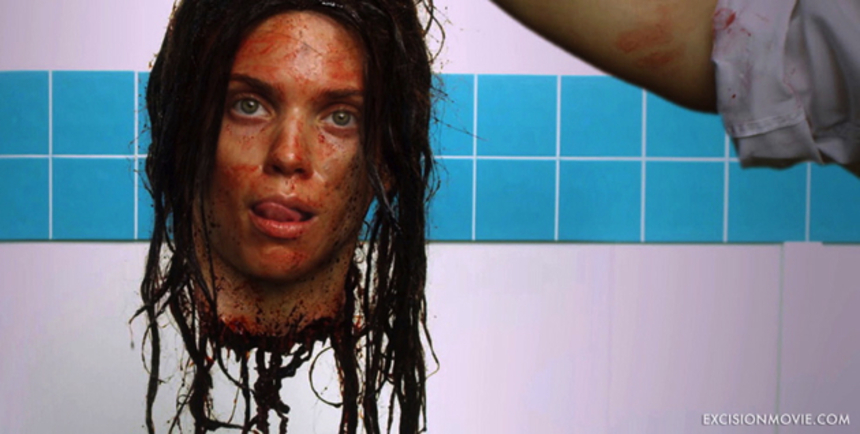L'Etrange 2012 Review: EXCISION is a Messy Combination of Sex and Scalpels

AnnaLynne McCord plays Pauline, an acne-ridden social misfit with borderline delusional aspirations of becoming a surgeon. She's the girl who raises her hand in sex-ed class and asks, straight-faced, "Can you catch an STD by having sex with a dead body?" In between making plans to lose her virginity during her period and engaging in vicious battles with popular students and all forms of authority, she is plagued (or pleasured?) by gory, music-video like dreams where surgery and sex intermingle. McCord plays Pauline with strong conviction, rarely compromising the character's authenticity or allowing the audience an easy way into her head. It's often unclear whether her actions are immature provocations or a result of some deeper psychosis. Most likely, Pauline isn't sure either, but regardless, the ambiguity of her mental health gives the film a sense of reckless unpredictability.
Naturally, she lives with a straight-laced family who has no idea what to do with her. Her mother (Traci Lords, humorously cast as the most conservative character in the film) is an appearance-conscious, desperate suburban mother who more or has more or less completely emasculated her passive, disillusioned husband (Roger Bart). And both parents clearly have more affection for her sweet, pretty younger sister, who has a life-threatening lung problem.
For the most part, the film plays like an episodic series of adventures as Pauline goes further and further off the deep end. Despite the structure though, the film isn't simply a series of shocking vignettes assembled with a smug, contemptuous smile. As the movie progresses, Director Richard Bates Jr. begins to cast each of his characters in a more empathetic light, revealing their inner desperation rather than simply reveling in the repulsive social behavior which it breeds. This approach is sometimes effective, especially during the repeated cuts to Pauline's frank, often hilarious prayers to a god she doesn't believe in. But more often, the scenes come off as contrived, and far too audience-aware.
Not to say that he should have simply let his characters play out as one-dimensional caricatures. But the reason that Todd Solondz and John Waters (who appears in the film) are so revered (and sometimes hated) is that both directors seem much more obsessed with their characters than with the audience's reaction to them. Waters clearly loves his bands of misfits and feels no need to explain that to the audience, which results in the disarmingly happy-go-lucky mood of most of his films, even when they hit new lows of depravity. Solondz, for better or worse, is far more obsessed with the mental space of his characters than with the audience's perception of it. Granted, this approach leads many to complain that his films are mean-spirited or misanthropic, but it also allows for empathy and humanity to emerge in surprising places and in ways that never seem forced or pandering.
Bates Jr.'s strategy feels far more calculated, with nail-on-the-head emotional reveals and strategically-placed monologues to make characters seem more human. To be fair, the scenes play reasonably well on their own, thanks to solid writing, directing and performance. But in context of the movie as a whole, these indiewood tactics feel like apologies in a movie that should have been unapologetic, and they dull the impact of the more provocative scenes that came before.
Fortunately though, Bates Jr. pulls off his inevitable shocking ending almost flawlessly, weaving humor, anger, horror and emotional ambivalence together while refusing to provide a tidy denouement. The effect of this ending, combined with the fact that the movie is well-paced, never boring and often very funny, make Excision well-worth seeing for fans of gory, sleazy and outsider cinema. There are also fun bit parts played by Waters, Ray Wise and Malcolm McDowell if you're into that sort of thing. It's only Bates Jr.'s inability to humanize his characters in a way that's as daring as the rest of his film which keeps it from joining the ranks of the misfit classics that inspired it.

Do you feel this content is inappropriate or infringes upon your rights? Click here to report it, or see our DMCA policy.






